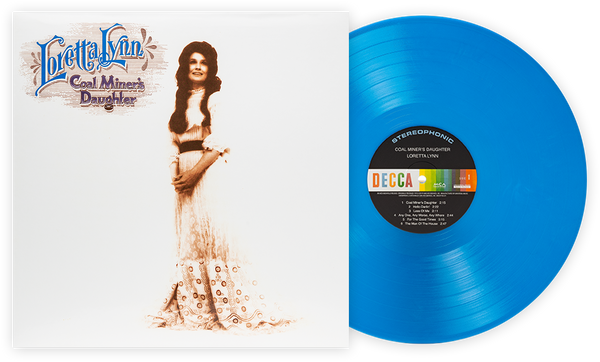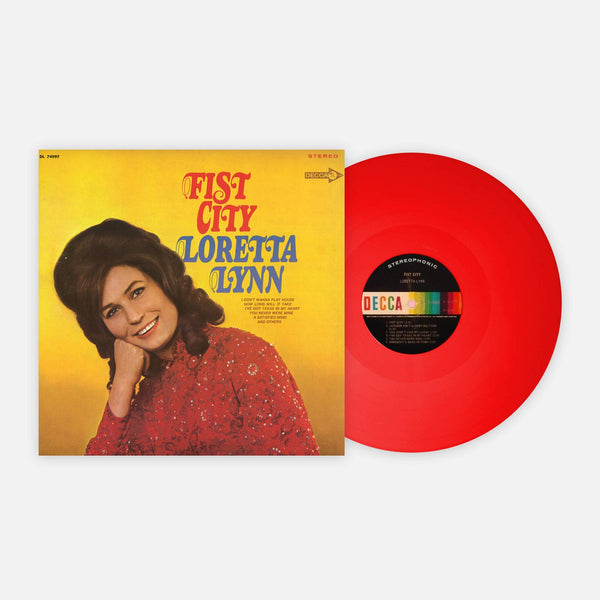Monimutkaisten tyttärien ylistys
Lue liner-notes meidän uudelleenjulkaisustamme Loretta Lynnin 'Coal Miner's Daughter'
Loretta Lynn on kotoisin osasta maata, jota kutsun kodikseni, ja Loretta Lynnin rakastaminen tuntuu kuin olisi kotona — tarkoitan, että hän saa minut yhtä aikaa puffaamaan rintaani ylpeydestä ja pudistamaan päätäni turhautuneena epäuskoon: rakkaus, jota tunnemme niitä kohtaan, joita todella tunnemme, kunhan olemme tunnustaneet ja hyväksyneet heidän monimutkaisuutensa ja ristiriitansa. Kuten kaikki, jotka tulevat tunnetuiksi, Lynn valitsi itsensä, jonka hän esitti maailmalle, mutta hänen julkinen persoonansa ei koskaan pyrkinyt peittämään kaikkia hänen virheitään, eikä hän koskaan kiirehtinyt oikeuttamaan tai anteeksi pyytelemään tekemiään päätöksiä — sellainen rehellisyys ja itsevarmuus, joka ainoastaan saa sinut rakastamaan henkilöä entistä enemmän, vaikka jotkut hänen tavastaan ilmaista näitä ominaisuuksia saavat sinut järjiltäsi.
Lynn kuvastaa tuttua alueellista ja sukupolvien välistä tapaa asua kahta ajattelutapaa. Hänen laulunsa ovat muotokuvia toiminnassa olevista naisista — ottamassa kantaa sukupuolten kaksoismoraaliin, käyttämässä ehkäisyä, iskemässä naiseen, joka nukkuu miehensä kanssa — mutta hän pysyi häiritsevässä avioliitossa lähes 50 vuotta. Hänellä oli rahaa ja vaikuttavuutta siirtyä eteenpäin, mutta hän ei koskaan tehnyt niin — vaikka hän käyttikin taidettaan päästäkseen sen läpi, kanavoiden avioliittonsa synkimmät hetket uransa vaikuttaviksi lauluiksi: eräänlainen kosto itsessään, luulisin. Vuonna 2000 Nashville Scene -lehdelle antamassaan haastattelussa Lynn muisti:
“Doo yritti aina selvittää, mikä säe [lauluissani] oli hänelle, ja 90 prosenttia ajasta jokainen säe oli hänelle… Mutta yleensä sanoin, 'Ehkä yksi säe oli sinulle, kultaseni.' Hän ei koskaan tiennyt, että kaikki ne olivat. Nämä laulut olivat tosielämästä. Me riitelimme kovasti ja rakastimme voimakkaasti. En koskaan tiennyt, mitä olin tulossa kotiin. En tiennyt, olinko tulossa taistelemaan vai mihin. Se oli melko vaikeaa. Doo joi paljon. Oli monia kertoja, jolloin olisin mieluummin ollut tulematta kotiin. Ja jos ei olisi ollut lapsiani, en olisi tullut.”
Lynnin elämä ja ura ilmentävät sekä sitkeyden parhaita että huonoimpia lopputuloksia, järkkymätöntä itsenäisyyttä ja voimakasta selviytymisen vaistoa. Hän oli tuskallisen ujo, kun hän aloitti esiintymisen, mutta pakotti itsensä tekemään sen, kunnes siitä tuli tottumus. Hän soitti ja kirjoitti monia omia laulujaan aikana ja genressä, jolloin se oli suhteellisen harvinaista, erityisesti naisartistsien keskuudessa. Televisioidussa 1972 Country Music Associationin palkintoseremoniassa tuottajat kielsivät häntä koskemasta tai suutelemasta Charley Prideä (joka on musta) lähetyksen aikana, ja hän suuttui ja teki sen silti. Hän on taitava liiketoimintanaiset — viime vuosina muuntamassa 1 450 hehtaarin ranchiaan Hurricane Millsissä, Tennessee, vilkkaaksi matkailukohteeksi, jossa voi telttailla, tutustua uudelleen luotuun hiilitunneliin tai ihmetellä hänen mekkojensa ja vintage-autojensa näyttelyitä. 16-vuotiaana hän meni naimisiin Oliver Vanetta “Doo” Lynnin kanssa — 21-vuotiaan salakuljettajan, joka oli ollut ihastunut häneen — kuukauden treffailun jälkeen, ja lähti sitten heti Butcher Hollerista, Kentuckysta, syrjäiseen puutaloon Washingtoniin, jossa hän oli saanut työtä. Doo oli sekava yhdistelmä manageria, isää ja aviomiestä: tukeva aviomies, joka kuuli Lynnin laulavan ja ei vain kannustanut häntä tekemään siitä uraa, vaan auttoi saamaan hänen uransa käyntiin ja hallitsemaan sitä; arvaamaton alkoholisti, joka petti ja pahoinpiteli häntä.
Mutta Lynn oli nainen, joka iski takaisin. Hän on tottunut sanomaan, että joka kerta kun Doo löi häntä, hän löi takaisin kaksinkertaisesti — kerran niin kovaa, että kaksi hänen hammastaan irtosi. Jotkut hänen suurimmista hiteistään ja rakastetuista lauluistaan ovat uhkia naisille, joiden kanssa hänet petettiin (“Fist City,” “It’ll Be Open Season On You,” outo nimellä “Your Squaw Is On The Warpath”). Samat säännöt pätevät kodin ulkopuolella. Laulut kuten “The Pill,” “Don’t Come Home A-Drinkin’ (With Lovin’ On Your Mind),” ja “Rated X” iskevät nokkelasti, puolustaen naisten toimintavaltaa seksuaalisuudessaan; laulu kuten “One’s On The Way” iloisesti iskee takaisin, valottaen tapoja, joilla marginaalista väestöä tukevat liikkeet usein sulkevat pois kaikkein marginaalisimmat joukossamme. Nämä ovat lauluja, jotka tekivät Lynnistä feministisen ikon, vaikka hän on vuodesta toiseen torjunut tuon leiman haastatteluissa ja julkaisemissaan omaelämäkerroissa, suoraan sanoen “En ole iso fani naisten vapautuksesta” hänen vuonna 1976 julkaistussa muistelmissaan Coal Miner’s Daughter ja, kun häntä pyydettiin kommentoimaan Naisten Marssia, hän sanoi “marssi on hieno… [mutta] heidän olisi pitänyt tehdä se tyylikkäämmin.”
Niinkin turhauttavaa kuin nähdä jokaisen, joka on niin linjassa feminististen uskomusten ja toimintojen kanssa kieltäytyvän tunnistamasta leimaa, ne, jotka kehystävät naisten toimintavallan, voiman ja tasa-arvon henkilökohtaisen käytännön hyödyn kautta — kyky mennä ehkäisyyn ottaakseen hallinta takaisin kehostaan ja seksielämästään, flirttailla tai käyttää lyhyitä housuja pelkäämättä kostoa — seisovat paljon suuremmassa mahdollisuudessa saavuttaa ne, jotka eivät vielä ole samaa mieltä kanssasi. Jon Parelesin vuonna 2016 julkaisemassa New York Times -profiilissa Lynnistä, muusikko Todd Snider antaa kuvauksen hänen laulunkirjoituksestaan, joka täydellisesti tiivistää voiman hänen kykynsä tehdä näistä monimutkaisista, systeemisistä kysymyksistä helposti lähestyttäviä ja henkilökohtaisia: “Älä yritä olla runoilija, puhu vain jollekin. [Lynnin] laulut vain kertovat sinulle, miltä heistä tuntuu.”
Siinä piilee niiden voima — ja myös niiden monimutkaisuus. Tuntemukset eivät ole koskaan suoria: kuten Lynn osoittaa, voit ymmärtää, että miehesi on väkivaltainen, mutta silti kutsua häntä elämäsi rakkaudeksi. Voit tietää, että hän on syyllinen pettämiseen, mutta silti suunnata vihasi hänen rakastajattarilleen. Voit elää elämää, jota alun perin muokkaa köyhyys ja joka on täynnä tragedioita, ja silti laittaa rohkean ja iloisesti hymyilevän naamion. Kun ensimmäiset kokemuksesi maailmasta eivät anna sinulle valtaa, jopa kun saat käsiisi jonkin, se tuntuu usein siltä, että ainoa tapa ulos on sen läpi. Mutta sinun ei tarvitse kärsiä hiljaa — eikä Lynn koskaan tehnyt.
Lynn oli todellinen tähti ja kotitalousnimi kauan ennen kuin hänen 15. albuminsa Coal Miner’s Daughter ilmestyi hyllyille joulukuussa 1970. Taaksepäin katsottuna Coal Miner’s Daughter sijoittuu tärkeään paikkaan (ja käännekohtaan) Lynnin jättiläisluetteloon: tuttu teema hänen työssään, ja varhainen tutkimus teemoista, jotka muotoilevat hänen taidettaan ja muokkaavat hänen uraansa siitä eteenpäin.
Useimmat Coal Miner’s Daughter -albumin 11 kappaleesta ovat hyvin valittuja covereita, jotka on kirjoittanut Kris Kristofferson, Conway Twitty ja muut ja jotka pohjautuvat tuttuun teemaan hänen tuotannossaan (hänen erinomaisessa ja uskomattoman laatuisessa podcastissaan Cocaine and Rhinestones, Tyler Mahan Coe mainitsee hyvin, että “Loretta Lynnin parhaat laulut ovat autobiografisia, olipa hän kirjoittanut ne tai ei.”): pettäville miehille seisominen ja tunteminen vuorotellen voittoisaa (“The Man of the House”) ja häpeää siitä (“Another Man Loved Me Last Night”), suhteen heittäminen tuleen (“For The Good Times”), uskottoman rakastajan hylkääminen lopullisesti sen sijaan, että antaisi mahdollisuuden toisensa jälkeen (“Snowbird”) ja tietenkin hyökätä naisten kimppuun, jotka yrittävät varastaa miehesi (“It’ll Be Open Season On You”). Lynnin cover Conway Twittyn “Hello Darlin’” ennustaa ammatillista kumppanuutta heidän välillään, joka tuottaisi viisi ykköshittiä viidessä vuodessa, Grammyn kappaleesta “After the Fire is Gone” ja — niiden ilmeisen kemian vuoksi — lukuisia huhuja siitä, että heillä oli suhde ja että Lynn oli vastuussa Twittyn ensimmäisen avioliiton loppumisesta.
Lynn itse kirjoitti kolme albumin kappaletta, joista jokainen vie sinut yhden peli-laudan ruudun lähemmäksi Loretta Lynnin takana raikasta rohkeutta. “What Makes Me Tick” löytää Lynnin keskustelemassa itsensä kanssa, miettimässä, miksi hän ei voi jättää miestä, joka ei koskaan kohtele häntä oikein (“The way I let you treat me / It’s enough to make me sick / I’m gonna have my head examined / And find out what makes me tick”). “Any One, Any Worse, Any Where,” yhteistyössä toistuvan yhteistyökumppanin Lorene Allenin (joka kirjoitti “The Pill”) kanssa ei varsinaisesti esitä öljyhaarukkaa Toiselle Naiselle, mutta laajentaa myötätuntoaan. Kirjoitettu naisen näkökulmasta, joka on suhteessa naimisissa olevan miehen kanssa, se siirtyy uhmakkuudesta, anteeksipyynnöstä, itsensä ruoskintaan — ja kuten aina, miehellä, joka on kaiken keskellä, on mahdollisuus osallistua tähän petokseen. Molemmat laulut ovat haavoittuvia tavalla, joka tuntuu raakammalta kuin hänen aikaisemmat materiaalinsa; kerran emme oppineet vain mitä Lynn tekisi, jos hän nappaisi sinut, vaan oppimme, miltä hänestä tuntui päästä itseensä kiinni.
Saavu albumin nimikappaleeseen. “Coal Miner’s Daughter” oli albumin ainoa single, ja Deccan jatkuvat epäilyt sen mahdollisuudesta menestyä hittinä osoittautuivat nopeasti vääriksi: Se oli ainoa kappale albumilta, joka sai merkittävää radioilmasoittoa, ja siitä tuli myöhemmin Lynnin neljäs ykkönen ja ensimmäinen crossover-hitti. “Coal Miner’s Daughter” -kappaleen voima piilee sen suoruudessa. Se on ylpeä ilman ylpeilyä, nostalginen ilman liiallista sentimentaalisuutta; se on elävä kurkistus köyhyydessä elävän perheen kokemuksiin, joka ei koskaan lankea epämiellyttävään köyhyys, joka on jalo kärsimys. Kappaleen optimismi — “Oltiin köyhiä, mutta meillä oli rakkautta / Se on ainut asia, josta isä varmisti” ja “Miksi, olen nähnyt hänen [huom. — Lynnin äidin] sormien vuotavan verta / Valittaakseen, ei ollut syytä” — ovat todellisia, eivät vaaleanpunaisia: Nämä ovat todellisia tapoja, joilla teemme parhaamme sillä, mitä meillä on. Se on asenne, jota Lynn on aina projisoitu, mielentila, joka näyttää ohjanneen hänen elämäänsä ja ohjanneen hänen päätöksiään. Kova elämä kasvattaa fatalismia ja toivoa yhtä paljon. Ne kietoutuvat toisiinsa, ilmenevät sekavilta tai rohkeilta valinnoilta.
Ennen kuin maailma kuuli “Coal Miner’s Daughter” -kappaleen, yleisö tiesi, että Lynn oli Kentuckyn hiilikentältä, nuori vaimo, jonka aviomies huomasi hänen taitonsa ja pakotti hänet hyödyntämään niitä, ja jonka perusteellinen omistautuminen, väkivalta ja epävakaus inspiroivat niin monia Lynnin lauluja: suuren rakkauden ja suuren taakan hänen elämässään. “Coal Miner’s Daughter” pyyhki puhtaan raidallisen ikkunan, antaen meidän nähdä hänen myrskyisän avioliittonsa yli, esitteli meille hänen pehmeämpää, introspektiivista puoltaan, ja rakensi — hänen ehdoillaan — täydellisemmän ymmärryksen Lynnistä ihmisenä. Tulevina vuosina Lynnin lapsuus tuli uudeksi inspiraation lähteeksi — vuodesta 1980 Coal Miner’s Daughter -elokuvasta, hänen äskettäisestä kiinnostuksestaan perinteisten appalaachilaisten balladien nauhoittamiseen, sekä kauhutarina “Little Red Shoes” hänen Jack White -tuotannossaan vuonna 2004: karmiva, mutta iloisesti esitetty tarina hänen varhaisesta kuoleman kohtaamisestaan ja rakkauden ja perheen voiman kyvystä ohjata meidät turvallisesti elämän synkimpien hetkien läpi.
< in="" em.="" parelesin="" profilissa="" lynn="" miettii,="" “panet="" koko="" sydämesi="" lauluun,="" kun="" satutat.="" et="" voi="" olla="" suojattu.”="" vaikka="" on="" täysin="" totta,="" että="" itsesi="" menee="" siihen,="" mitä="" ikinä="" teetkään="" käsitelläksesi="" kipuasi,="" väitän,="" laulunkirjoitus="" silti="" eräänlainen="" itsepuolustus.="" kanavoimalla="" vaikean="" lapsuuden="" tai="" avioliiton="" kipua="" lauluseen,="" valitset="" silti,="" paljastat="" ja="" päätät,="" mikä="" liian="" herkkää="" paljastettavaksi.="" näytät="" maailmalle="" lopputuotteen,="" prosessia.<="" p="">On vaikeaa lukea Lynnin avioliitosta ja olla haluamatta palata ajassa taaksepäin ja repiä hänet mukaansa, koko ajan huutaen: “Olet parempi kuin tämä.” On vaikeaa kuvitella, että joku hänen kykynsä ja päättäväisyytensä kanssa sietäisi vuosikymmenten väärinkäytöstä, tai ymmärtää, miten henkilö voi niin älykkäästi arvostella lukemattomia tapoja, joilla perpetuoimme misogyniaa, samalla kun syytetään naisia suhteista ja pysytään väkivaltaisessa suhteessa. Lynn on muistutus siitä, että ihmiset ovat monimutkaisia, että me olemme kaikkea, mitä meille on koskaan tapahtunut, kaikkea, mitä meille on koskaan sanottu, kaikki samaan aikaan. Paras mitä meistä kukaan voi tehdä, on selittää, miltä meistä tuntuu juuri nyt, mikä on juuri se, mitä Lynnin laulut ovat aina tehneet niin hyvin.
Susannah Young is a self-employed communications strategist, writer and editor living in Chicago. Since 2009, she has also worked as a music critic. Her writing has appeared in the book Vinyl Me, Please: 100 Albums You Need in Your Collection (Abrams Image, 2017) as well as on VMP’s Magazine, Pitchfork and KCRW, among other publications.





